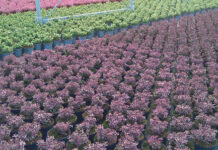
Farming and the agricultural sector is going through a positive period. In the current year, prices for most farm produce are running ahead of 2010 levels, with milk, cattle and sheep prices all up on a year ago. Grain growers have also enjoyed a good harvest, with the exception of those in some north westerly counties where weather has had a major impact on harvesting. The prices for some inputs such as fuel and fertilizer are also up this year.
Speaking at the launch of the Teagasc Annual Report 2010 in Dublin recently,
Teagasc chairman Dr Noel Cawley said: ”Ambitious targets to increase the output and value from the agriculture and food sectors have been identified in the Food Harvest 2020 report and Teagasc, through its research, education and advisory activities are working with farmers and those in the industry to achieve those challenging targets.”
Teagasc Director, Professor Gerry Boyle said: ”With the abolition of milk quotas approaching there will be opportunities emerging for young Irish farmers to expand and enter milk production. Low cost grass based milk production systems provide Irish farmers with a comparative advantage that could be exploited in a quota free environment. However in the run up to their abolition, dairy farmers must carefully match their production to their quota to avoid possible super levy fines.”
Education
Demand for Teagasc run agriculture and horticulture courses continue to grow. In the 2010/11 academic year there were 1,673 new enrolments onto Teagasc run courses bringing the total number of students to 3,256.
Demand for courses increased again in the 2011/12 academic year. A number of measures were taken, including the redeployment of advisers into teaching roles, the recruitment of six new teachers and increases in class size, to meet this increased demand. Five additional courses are due to commence in Teagasc regional education centres, including a new full time ACA course in Longford.
Total number of students participating in college courses now amount to 2,426 and when local Advanced Certificate in agriculture (ACA) courses are taken into account there are a total of 3,540 students participating in Teagasc run courses, in the current academic year.
Advisory
The Teagasc advisory service has undergone substantial change over the last few years. It is now organised around 12 regional areas, down from 18 a few years ago, and provides services to 40,000 farmer clients. The transfer of knowledge onto farms through discussion groups has increased, with increased number of farmers, particularly dairy farmers, participating in these groups.
As part of the Teagasc Change Programme, the office network has been rationalised. Since the process began in early 2009, 31 offices have closed to-date, with five more offices due to close before the end of this year. Three more are identified for closure in 2012.
Research
Teagasc’s research activities are centred around four programmes – Food programme; Animal and Grassland programme; Crops, Environment and Land use programme; and Rural Economy and Development programme.
These are aimed at improving the competiveness and sustainability of Irish farming and the food industry. Initiatives include a strategic alliance with UCC in food research to build on the achievements of both organisations in the fields of probiotics. In animal breeding, work on genomics to utilise genetic selection in dairy, beef and sheep breeding. In crops, Teagasc research assisted in sequencing the potato genome. Analysis by the rural economy unit will play a vital role in assessing the CAP reform proposals and to achieve the best outcome for Ireland.
Staff numbers
The number of people working in Teagasc has reduced by 280 between 2008 and 2010. The Employment Control Framework (ECF) set by the government requires staff numbers to reduce by a further 240 by 2014. To achieve this level of reduction, a Voluntary Redundancy and a Voluntary Early Retirement Schemes (VR/VER) were offered to support staff working in the organisation. Applications closed on the 1 November, 2011. One hundred and twenty people (85 full time equivalents) applied to avail of the scheme and they now have a month ‘cooling off period’ before they confirm their decision.
Budget
Total Teagasc income for 2010 amounted to €165.44 million, excluding net deferred funding for pension, down from €180.83 million in 2009. This was primarily due to a reduction in state funding and operational income. Current expenditure declined from €186.37 million, excluding net deferred funding for pensions, to €166.63 million and when combined with the movement in capital reserves of €4.578 million resulted in a overall outcome of +€3.387 million for 2010.






